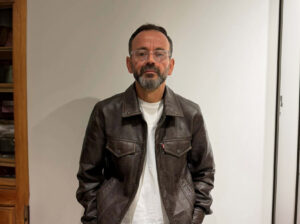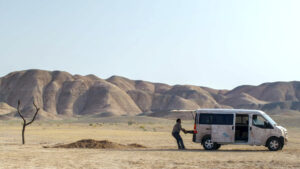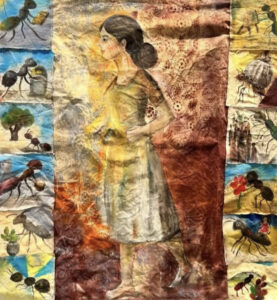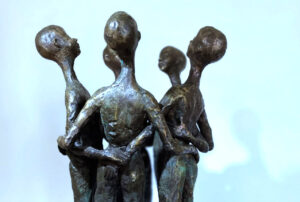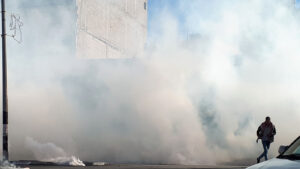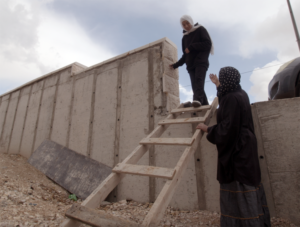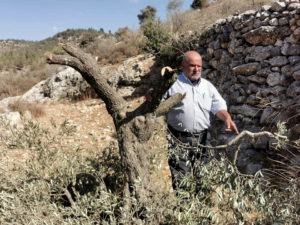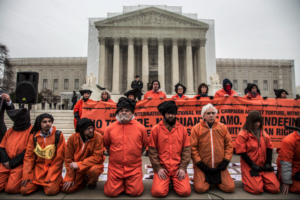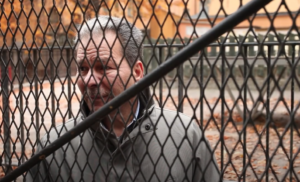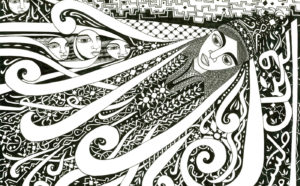Select Other Languages French.
Since October 7, Palestinian women in the West Bank have experienced increasing intimidation, imprisonment and violence. This story published with and thanks to our friends in Paris at The Dial.
In the early hours of April 7, 2024, Israeli forces stormed the homes of 25-year-old Layan Kayed in Ramallah and 23-year-old Layan Nasir in Birzeit, both located in the occupied West Bank. The two women were arrested at gunpoint and placed in “administrative detention” without charges.
Nasir’s family said that the soldiers offered no explanation or indication of what charges were being brought against her. They didn’t need to: Under “administrative detention”, Israeli authorities can arrest a person even before any crime has been committed, and without revealing the nature of the allegations. Once arrested in this way, a prisoner can be held in administrative detention in six-month stints that can be renewed again and again without charge or trial. At the beginning of April 2025, there were almost 3,500 Palestinians held in administrative detention, according to Addameer, a Ramallah-based nongovernmental organization that supports Palestinian political prisoners. Among these thousands are minors, journalists, activists and human rights defenders.
Near the end of April 2024, the Israeli military told international media that Nasir had been arrested based on intelligence that suggested she “poses a security threat.” No further details were given to her family. Kayed and Nasir were held in administrative detention without charge in Damon Prison, across the border in Israel, until their release eight months later.
According to Addameer and the United Kingdom-based organization Lawyers for Palestinian Human Rights, both women had previously been arrested and detained when they were students at Birzeit University — Kayed in 2020 and Nasir in 2021. Alongside other female university students, they had been charged with participating in and affiliating with a student groupthat Israel had deemed a terrorist organization.
Since Hamas’ terrorist attacks on October 7, 2023, Palestinians in the West Bank like Kayed and Nasir have been targeted by Israel’s heightened militarization and subjected to increased surveillance, mass arrests and abuse. In April 2024, Palestinian Authority’s Commission of Detainees and Ex-Detainees Affairs said that Israeli raids on homes of former female detainees in the West Bank have become a daily occurrence as part of a strategy of retaliation and revenge against women and girls. The Israel Defense Forces denies this claim. An IDF spokesperson told me that there has been “a significant increase in terrorist attacks” in the West Bank since October 7 and that the IDF has been conducting “counter-terrorism operations against the Hamas terrorist organization, to protect the State of Israel.” The spokesperson emphasized that the IDF “operates in a targeted and precise manner” and does not “seek to obstruct the daily lives of Palestinian civilians.”
The United Nations and other organizations have reported further escalation of military violence and arrests in the West Bank since the ceasefire deal that began on January 19, 2025. The deal ended on March 18, when Israel launched a series of airstrikes on Gaza that killed hundreds.
Palestinians are also subject to charges of inciting violence over social media. Since October 7, police in Israel have adopted what they call a policy of “zero tolerance” toward individuals posting, sharing or otherwise interacting with social media that are deemed to express support for Hamas or to incite against the state of Israel, its government symbols, elected officials, military personnel or police. Danny Danon, Israel’s Permanent Representative to the U.N., has justified this approach on the grounds that “it’s necessary to stop [the promotion of violence] at the initial stages.” Ayah Kutmah, who researches prisoners’ rights and human rights in the Middle East and has worked with Addameer, said that those accused of incitement are often prominent women in Palestinian society, including journalists and human rights activists.
Human rights groups have said that thousands of Palestinians in Israeli detention are being held under laws and military orders, like administrative detention, that allow detention without trial or charge. The IDF told me that it detains individuals “when there is reasonable suspicion of their involvement in terrorist activities.” The spokesperson said that “relevant suspects” are held under detention orders “issued in accordance with the law” and that in some cases, “in full alignment with Israeli law and the Geneva Conventions, detainees are held in preventative detention in order to keep them away from the fighting, due to the threat that they pose.”
Inside Israeli prisons, the treatment of Palestinians has worsened, with reports suggesting that current conditions violate both international humanitarian law and international human rights law. Since October 7, more than 14,000 Palestinians have been arrested, Addameer said at the end of February 2025 (this includes detainees who have since been released). The IDF did not respond to my request for comment on this figure. Palestinian prisoner defense groups have documented 490 cases of arrests of women and girls during this period. (This figure includes arrests in the occupied West Bank and East Jerusalem, as well as in Israel. The prisoner defense groups note that there is no clear estimate of how many women and girls have been arrested in Gaza.)
Female prisoners suffer gendered torture and mistreatment; psychological abuse, violence and sexual harassment and assault are common. I spoke to 22 Palestinian women who are former detainees about their experiences in Israeli prisons, as well as to detainees’ family members, to lawyers and to Israeli, Palestinian and international NGOs in order to understand how women are being targeted through arrests and rearrests in the West Bank and East Jerusalem and how their detainment is breaking international laws. The system they described was one without rights or due process, no matter what they had or had not done.
Changes to Israel’s judicial system made in the wake of Hamas’ attacks have exacerbated a situation that many lawyers and human rights researchers have long seen as unjust. In July 2023, the United Nations estimated that approximately one million Palestinians had been detained in the occupied Palestinian territories, which consist of the West Bank, East Jerusalem and the Gaza Strip, since Israel captured the land in 1967. According to U.N. data, a fifth of Palestinians are imprisoned by Israel at some point in their lives. Repeat arrests are common, making prison a regular occurrence for many living in the occupied territories.
Discrimination pervades every aspect of the Israeli military judicial system. The nearly three million Palestinians living in the occupied West Bank are, despite being civilians, governed by military law and prosecuted in Israeli military courts designed specifically for Palestinians. They lack basic fair trial guarantees and are prosecuted according to orders issued by Israeli military commanders. In contrast, the nearly half a million Israeli settlers in the West Bank are governed by civil and criminal law and tried in Israeli civil courts.
Since 1967, Israeli authorities have issued more than 2,500 military orders in the occupied Palestinian territories. Sahar Francis, the general director of Addameer, told me that these military orders control every aspect of life for Palestinians in the occupied territories. The orders limit Palestinians’ access to public health, water, education, land and property; they also limit political and cultural expression, association, peaceful protest and free movement. For example, under a military order issued in 1967 and still used today, Palestinians are forbidden from participating in gatherings of 10 or more people without a permit if the cause “could be construed as political.” Settlers need a permit only if a demonstration occurs outdoors, is larger than 50 people and includes “political speeches and statements.”
Before October 7, military law in the West Bank dictated that Palestinians could be held for up to eight days before they saw a military judge. Under Israeli civil law, by comparison, a person must be brought before a judge within 24 hours after arrest; in extraordinary circumstances, that time period can be extended to 96 hours. After October 7, Israel declared a state of emergency. Detention laws were expanded, meaning that individuals suspected of “security offenses” could be denied access to lawyers for up to 90 days. The Bar Human Rights Committee of England and Wales has estimated the conviction rate in the military courts to be above 99%.
Today Israel operates one prison in the West Bank, Ofer Prison. Under the Fourth Geneva Convention, it is against international law for an occupying power to transfer an occupied people from the occupied territory. Yet Israel regularly transfers prisoners from the West Bank to prisons in Israel. Transferring Palestinian prisoners between prisons makes it harder for lawyers, who are mostly Palestinian themselves, to meet with and advise detainees. Furthermore, according to Francis, lawyers are often given almost no notice that their clients are about to be moved from one prison to another.
In September 2024, organizations including Save the Children and Human Rights Watch submitted a statement to the U.N. noting that since October 7, access to detainees in the West Bank has been restricted for human rights monitors, lawyers and family members. Such access to detainees in Gaza, the report noted, is “almost non-existent.” Members of the International Committee of the Red Cross usually visit Palestinian prisoners regularly, but since October 7, they have been refused access to Israeli prisons. The Israeli government has given no clear explanation for this refusal.
The United Nations Human Rights Office in the Occupied Palestinian Territory said in December 2023 that it was “seriously concerned” about the increase in the number of Palestinians arrested and detained by Israeli security forces since October 7, “in many instances without any direct evidence” of a crime.
During the tense weeklong ceasefire at the end of November 2023, 105 of the hostages Hamas held in Gaza were released, as were 240 Palestinian prisoners held in Israel. Of these 240, 68 were women, and 107 were under the age of 18, including three girls. Three-quarters of all those released had never been convicted of a crime, according to data from the Israeli government. Over that same week of the ceasefire agreement, Israel arrested 260 other Palestinians, according to the Palestinian Prisoners Club.
Before their release, many of the prisoners were threatened with rearrest or other forms of punishment. One of the Palestinian women told me that she was asked to sign papers in Hebrew that were not translated. She later learned that the documents included threats of rearrest over any activity Israel deemed “problematic,” but they did not explicitly define what would constitute a problematic act. She told me the papers also included other punitive measures, including travel bans and mandatory visits to an interrogation center after her release. Another former detainee told me that Israeli officials warned her not to leave her house or she could be arrested again. Another said she was asked to sign a pledge that flags would not be put up outside her home and that there would be no displays of joy from her or her family when she returned home. “They asked us not to talk politics with the media and told us that any statement [we made] would be followed up,” she told me. (These women spoke to me on the condition of anonymity.) One family of a detainee released after October 7 and then rearrested said that they received a phone call from an Israeli officer who threatened arrest if they spoke to the press. Another detainee who has been released, rearrested and released again since October 7 said that on her second release, she was told to sign a pledge not to harm Israel’s security, and was threatened with arrest “at any moment.” She told me that her family was also threatened with arrest.
A report by the Ramallah-based Women’s Centre for Legal Aid and Counselling in February 2024 said the center had spoken to Palestinian women who had received threatening phone calls from Israeli officials after their release. In these calls, they were warned that they would be “returned to prison, or that harm would be inflicted on their incarcerated family members if they disclosed their experiences.”
Of the 240 Palestinian prisoners released in November 2023, 27 have been rearrested, Addameer told me in November 2024. Six of these are women, and six are under the age of 18. Two women were arrested again after their release in November 2023, released and then arrested a third time, the NGO added.
Walaa Tanji, 28, from the West Bank, is one of the six women who were released in November 2023 and then rearrested. She is one of the most prominent female detainees, who has repeatedly spoken to the media about her treatment in prison and about her view that Palestinians have the right to use force to resist occupation. After her release in November 2023, she publicly celebrated the October 7 attacks.
Her family told me that they have not been informed of the reason for her second arrest or of any allegations against her. She was first arrested in August 2022 under accusations by the Israeli military that she was planning an attack on an Israeli checkpoint with two other women. Her family has denied these accusations. She was held in Damon Prison until her release in November 2023. Her rearrest took place on March 12, 2024, and she was returned to Damon Prison, where she was told she would be held for six months under administrative detention. Her family said that she has not been accused of any further crime. In September 2024, her administrative detention charge was renewed for another six months.
Tanji’s sister told me that even after her release in November 2023, Tanji didn’t believe she was really free. “She was scared that the prisoners who were released in the deal would be returned to prison.” Tanji told her sister that she had been put in solitary confinement and severely beaten. After her rearrest, Tanji’s sister said her family was not allowed to contact her, and she was not able to receive visits from a lawyer.
In January 2025, Tanji was released as part of the ceasefire deal and is now back home. Her sister said that during Tanji’s recent imprisonment, prisoners were beaten, deprived of cleaning and hygiene products, forbidden from going outside and denied access to health care. In April, Tanji told me she had been arrested again, in March, but was not told on what charges. She said that during the interrogation, her brother was brought in with an injured hand and leg “in order to weaken me and force me to confess to charges I don’t know about.” While detained, she said, she was threatened with rape and was severely beaten, resulting in injuries to her neck. “I’m very afraid I’ll be arrested again at any moment,” she told me.
While reports of abuse during arrest and inside prison are nothing new, the 22 women I spoke with all alleged serious and often gendered mistreatment, both physical and psychological, which many said severely worsened after October 7. They described beatings, humiliation, overcrowding, belongings being confiscated, and food, water, hygiene products and medicine being withheld.
Some of the current conditions are official Israeli policy. In a statement in November 2023, the Israel Prison Service said conditions for Palestinian political prisoners would become harsher, “as part of the war effort.” In January 2024 and then again in December 2024, Israel’s Knesset extended the “state of emergency in prisons,” a temporary order that was instituted after October 7. According to Amnesty International, this order gives Itamar Ben-Gvir, Israel’s national security minister, the ability to “deny sentenced prisoners access to visits by lawyers and family members; to hold detainees in overcrowded cells; to deny them outdoor exercise and to impose cruel collective punishment measures such as cutting off water and electricity for long hours.” A U.N. Human Rights Office report in July 2024 found that often 10 female inmates were being held in cells designed to accommodate six. Other reports have described prisoners, including pregnant prisoners, being denied necessary health care; prisoners have also reportedly been denied access to daylight. In April 2024, Francis told me that some prison health clinics that were completely closed after October 7 had still not reopened, leaving detainees without proper treatment. Several provisions of international law, including the Fourth Geneva Convention, specify the state’s obligation to provide prisoners with adequate medical care, routine medical examinations and necessary medicines, as well as access to daylight. The Israel Prison Service did not respond to my requests for comment.
Testimonies from prisoners since October 7 have suggested that the Israel Prison Service has been cutting Palestinian prisoners’ calorie intake. “There is no starvation, but my policy does call for reducing conditions, including food and calories,” Ben-Gvir said in June 2024. He called the policy a “deterrent measure.” In April 2024, the Association for Civil Rights in Israel, along with the Israeli human rights group Gisha, filed a petition in the High Court of Justice stating that the food reduction policy is a form of starvation and torture and that it violates Israeli and international law.
Several women I spoke to described experiencing physical violence from prison guards. Twenty-six-year-old Marah Bakeer was among the Palestinian prisoners released during the November 2023 ceasefire, after serving eight years and one month of her eight-and-a-half-year sentence. Bakeer was arrested in October 2015, when she was 16 years old, for allegedly attempting to stab an Israeli border police officer in the Beit Hanina neighborhood of East Jerusalem. She was shot multiple times. She denies the accusation. “It was a Monday, I was on my way home from school,” she told me. “No one told me why they shot me.”
She told me that on October 7, 2023, she and the other women she shared a room with were attacked by guards at Damon Prison. She was then moved to another prison, in northern Israel, and put in solitary confinement until she was released on November 24, 2023. Bakeer also told me about beatings in prison. “We were beaten with everything, with hands, feet and batons,” she said. “Even the elderly prisoners were beaten.” She told me that the prison guards were trying to break their bones.
Hanan Barghouti, 60, was arrested on September 5, 2023 and held under administrative detention. After she was released in November 2023 during a prisoner exchange, she described having seen two other female prisoners being beaten on their genitalia. Barghouti said she herself was groped and assaulted while blindfolded. She was rearrested in March 2024 and again held under administrative detention until December. Two weeks ago, Barghouti was arrested again.
A Physicians for Human Rights report published in February 2024 contained descriptions of guards inflicting brutal violence on female prisoners. A report published in March by the Palestinian Prisoners Society included testimony from female detainees of being kicked, hit and electrocuted. A joint submission to the U.N. in February 2024 by Israeli and Palestinian rights groups cited reports of female detainees being beaten while naked and threatened with rape and assault.
A February 2024 report from the Women’s Centre for Legal Aid and Counselling (WCLAC) described rape threats and invasive strip searches, conducted both individually and in groups. Detainees reported being kept naked for long periods and asked to open their legs and hold degrading positions, sometimes while male guards looked on and fondled themselves.
The report described women being forced to undress and walk naked in front of their children, on the orders of an Israeli soldier with a large dog. Another woman said that a soldier opened the zipper of his pants and threatened to make her sit on his lap “over my penis.” Another female detainee recounted an interrogator asking her “How many men have you slept with and did you have fun with them?” In March, Kifeya Khraim, from the WCLAC, testified at a U.N Commission of Inquiry about Israeli female officers raping both male and female prisoners by “inserting objects inside genitals.” The officers often photographed and filmed the assaults.
A July 2024 U.N report also included descriptions of forced nudity and “inappropriate touching” of Palestinian women by both male and female soldiers. A February 2024 U.N. statement said that since October 7 “at least two female Palestinian detainees were reportedly raped while others were reportedly threatened with rape and sexual violence.”
Palestinian women have been increasingly subjected to online harassment, smear campaigns and doxxing by Israeli officials and soldiers. For example, between October 7 and December 2023, on the social media platform X, Ben-Gvir posted photos of six Palestinian women who had been detained in Israel and the West Bank. His captions for the photos claimed that the women had connections to terrorism and mentioned crimes such as incitement and hate speech committed after the events of October 7. “We started talking to them in a language they understand,” he wrote in one caption. “This,” he wrote in another, “is a clear message to all those inciting keyboard heroes – the Israel Police will reach each and every one of you. Don’t test us.” Four of the women in the photos were sitting in front of an Israeli flag, and four of the women had their hands cuffed or tied with plastic restraints. All but one of the women’s faces were visible.
According to a September 2024 report issued by the United Nations’ Independent International Commission of Inquiry on the Occupied Palestinian Territory, at least 53 Palestinian detainees died in Israeli detention facilities between October 7, 2023, and July 15, 2024. (Forty-four of these detainees were from Gaza, and nine were from the West Bank.) At the beginning of March, Addameer said that this figure now stood at 62. “Deceased detainees’ bodies have largely not been returned to their families for burial,” the September 2024 report noted. Doctors from Physicians for Human Rights-Israel participated in five of the autopsies of Palestinian men. A March 2024 report from this organization and other Israel-based human rights groups noted that in two of these autopsies, there were “severe signs of violence and assault,” including fractured ribs and a broken sternum, while in another, a physician “found that the specific cause of death was medical neglect.” At least four cases may have involved denial of medical treatment.
More than half of the former detainees I contacted said they could not speak to me, fearing rearrest or reprisals against their families. “Even if we are no longer in prison, we remain under Israel’s watch,” one female former detainee told me.
Lama Ghosheh, a journalist who was arrested three times between 2017 and 2022 on charges of “incitement” for her reporting and her posts on social mediaand has spent time under house arrest in East Jerusalem, told me that since October 7, Jerusalem has “returned to military rule, as it was in 1948 and 1969.” It’s an environment in which Palestinians are “forbidden from talking, from expressing opinion — every person is practicing self-censorship.”
Even those who aren’t rearrested face difficulties, Addameer’s Sahar Francis told me: A former detainee will struggle to get a permit to travel even for medical reasons, such as going from the West Bank to East Jerusalem to access hospital care.
During the ceasefire that began on January 19, Israel released around 1,900 Palestinian prisoners. Hamas released 25 living hostages and the remains of eight hostages. Shortly after the ceasefire began, Israel launched a military operation in the West Bank that displaced around 40,000 Palestinians. Its attacks on Gaza in March, which ended the ceasefire, also brought an end to the prisoner exchange.
This story is co-published with The Dial.









